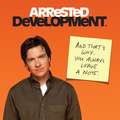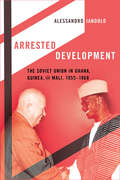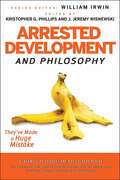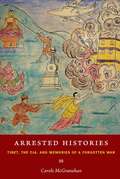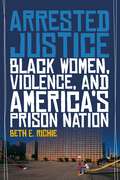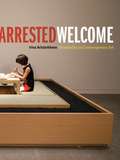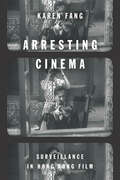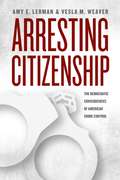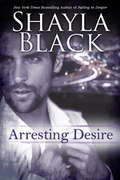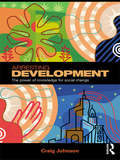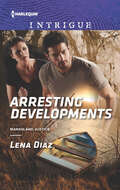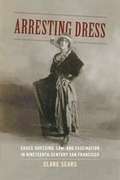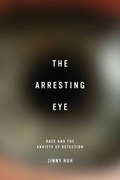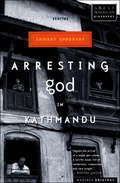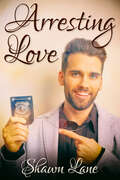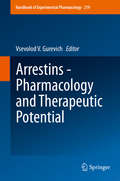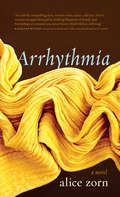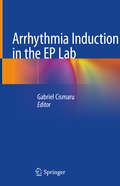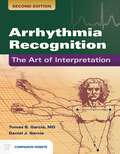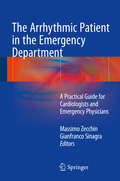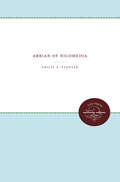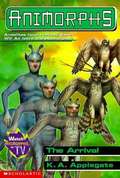- Table View
- List View
Arrested Development: And That's Why . . . You Always Leave a Note.
by Arrested DevelopmentAnd now the story of a wealthy family who lost everything, and the one son who had no choice but to keep them all together . . . ItOCOs "Arrested Development. " Meet the formerly wealthy and habitually dysfunctional Bluth family. When the family patriarch George Sr. is sent to prison for shifty accounting practices, the Bluths must face reality?or not. Since the family assets have been frozen and the family business is in jeopardy, it looks like they may have to give up their lavish lifestyle. Worse yet, they may have to go out and get jobs The only one who seems to understand the seriousness of their predicament is Michael, who realizes itOCOs up to him to guide his eccentric family into this new chapter of their lives: Chapter 11. Full of the most memorable quotes and images from some of the best moments from the original three seasons of the show, "Arrested Development: And ThatOCOs Why . . . You Always Leave a Note" offers valuable life lessons from Michael, G. O. B. , Lucille, George Sr. , Lindsay, George Michael, Tobias, and the rest of the Bluth gang with chapters including: Family First, Huge Mistakes, Parental Guidance, Risky Business, and more. Relive all your favorite A"rrested Development" moments with this must-have companion to the ground-breaking comedy series. "
Arrested Development: The Soviet Union in Ghana, Guinea, and Mali, 1955–1968
by Alessandro IandoloArrested Development examines the USSR's involvement in West Africa during the 1950s and 1960s as aid donor, trade partner, and political inspiration for the first post-independence governments in Ghana, Guinea, and Mali. Buoyed by solid economic performance in the 1950s, the USSR opened itself up to the world and launched a series of programs aimed at supporting the search for economic development in newly independent countries in Africa and Asia. These countries, emerging from decades of colonial domination, looked at the USSR as an example to strengthen political and economic independence. Based on extensive research in Russian and West African archives, Alessandro Iandolo explores the ideas that guided Soviet engagement in West Africa, investigates the projects that the USSR sponsored "on the ground," and analyzes their implementation and legacy. The Soviet specialists who worked in Ghana, Guinea, and Mali collaborated with West African colleagues in drawing ambitious development plans, supervised the construction of new transport infrastructure, organized collective farms and fishing cooperatives, conducted geological surveys and mineral prospecting, set up banking systems, managed international trade, and staffed repairs workshops and ministerial bureaucracies alike. The exchanges and clashes born out of the encounter between Soviet and West African ideas, ambitions, and hopes about development reveal the USSR as a central actor in the history of economic development in the twentieth century.
Arrested Development and Philosophy
by Kristopher Phillips J. Jeremy WisnewskiA smart philosophical look at the cult hit television show, Arrested Development Arrested Development earned six Emmy awards, a Golden Globe award, critical acclaim, and a loyal cult following-and then it was canceled. Fortunately, this book steps into the void left by the show's premature demise by exploring the fascinating philosophical issues at the heart of the quirky Bluths and their comic exploits. Whether it's reflecting on Gob's self-deception or digging into Tobias's double entendres, you'll watch your favorite scenes and episodes of the show in a whole new way. Takes an entertaining look at the philosophical ideas and tensions in the show's plots and themes Gives you new insights about the Bluth family and other characters: Is George Michael's crush on his cousin unnatural? Is it immoral for Lindsay to lie about stealing clothes to hide the fact that she has a job? Are the pictures really of bunkers or balls? Lets you sound super-smart as you rattle off the names of great philosophers like Sartre and Aristotle to explain key characters and episodes of the show Packed with thought-provoking insights, Arrested Development and Philosophy is essential reading for anyone who wants to know more about their late, lamented TV show. And it'll keep you entertained until the long-awaited Arrested Development movie finally comes out. (Whenever that is. )
Arrested Histories: Tibet, the CIA, and Memories of a Forgotten War
by Carole McgranahanIn the 1950s, thousands of ordinary Tibetans rose up to defend their country and religion against Chinese troops. Their citizen army fought through 1974 with covert support from the Tibetan exile government and the governments of India, Nepal, and the United States. Decades later, the story of this resistance is only beginning to be told and has not yet entered the annals of Tibetan national history. In Arrested Histories, the anthropologist and historian Carole McGranahan shows how and why histories of this resistance army are "arrested" and explains the ensuing repercussions for the Tibetan refugee community. Drawing on rich ethnographic and historical research, McGranahan tells the story of the Tibetan resistance and the social processes through which this history is made and unmade, and lived and forgotten in the present. Fulfillment of veterans' desire for recognition hinges on the Dalai Lama and "historical arrest," a practice in which the telling of certain pasts is suspended until an undetermined time in the future. In this analysis, struggles over history emerge as a profound pain of belonging. Tibetan cultural politics, regional identities, and religious commitments cannot be disentangled from imperial histories, contemporary geopolitics, and romanticized representations of Tibet. Moving deftly from armed struggle to nonviolent hunger strikes, and from diplomatic offices to refugee camps, Arrested Histories provides powerful insights into the stakes of political engagement and the cultural contradictions of everyday life.
Arrested Justice: Black Women, Violence, and America’s Prison Nation
by Beth E. RichieIlluminates the threats Black women face and the lack of substantive public policy towards gendered violenceBlack women in marginalized communities are uniquely at risk of battering, rape, sexual harassment, stalking and incest. Through the compelling stories of Black women who have been most affected by racism, persistent poverty, class inequality, limited access to support resources or institutions, Beth E. Richie shows that the threat of violence to Black women has never been more serious, demonstrating how conservative legal, social, political and economic policies have impactedactivism in the U.S.-based movement to end violence against women. Richie argues that Black women face particular peril because of the ways that race and culture have not figured centrally enough in the analysis of the causes and consequences of gender violence. As a result, the extent of physical, sexual and other forms of violence in the lives of Black women, the various forms it takes, and the contexts within which it occurs are minimized—at best—and frequently ignored. Arrested Justice brings issues of sexuality, class, age, and criminalization into focus right alongside of questions of public policy and gender violence, resulting in a compelling critique, a passionate re-framing of stories, and a call to action for change.
Arrested Welcome: Hospitality in Contemporary Art
by Irina AristarkhovaInterpreting the meaning of hospitality in an unwelcoming political moment Amid xenophobic challenges to America&’s core value of welcoming the tired and the poor, Irina Aristarkhova calls for new forms of hospitality in her engagement with the works of eight international artists. In this first monograph on hospitality in contemporary art, Aristarkhova employs a feminist perspective to critically explore the artworks of Ana Prvački, Faith Wilding, Lee Mingwei, Kathy High, Mithu Sen, Pippa Bacca, Silvia Moro, and Ken Aptekar and asks who, how, and what determines who is worthy of our welcome. Spanning a diverse range of contemporary art practices, Arrested Welcome shows how artists challenge our existing notions of hospitality—culturally, philosophically, and politically. From the role of &“microcourtesies&” in social change to the portrayal of waiting as a feminist endeavor, Aristarkhova looks deeply into topics such as gender stereotypes of welcome, ways to reclaim civility, and the means by which guests (sometimes human, sometimes animal) push the limits of our hosting traditions. Blending a feminist analysis of hospitality with in-depth case studies on how contemporary artists stimulate personal reflection and political engagement, Aristarkhova initiates these important conversations at a critical time of national and international hospitality crises.
Arresting Cinema: Surveillance in Hong Kong Film
by Karen FangWhen Ridley Scott envisioned Blade Runner's set as "Hong Kong on a bad day," he nodded to the city's overcrowding as well as its widespread use of surveillance. But while Scott brought Hong Kong and surveillance into the global film repertoire, the city's own cinema has remained outside of the global surveillance discussion. In Arresting Cinema, Karen Fang delivers a unifying account of Hong Kong cinema that draws upon its renowned crime films and other unique genres to demonstrate Hong Kong's view of surveillance. She argues that Hong Kong's films display a tolerance of—and even opportunism towards—the soft cage of constant observation, unlike the fearful view prevalent in the West. However, many surveillance cinema studies focus solely on European and Hollywood films, discounting other artistic traditions and industrial circumstances. Hong Kong's films show a more crowded, increasingly economically stratified, and postnational world that nevertheless offers an aura of hopeful futurity. Only by exploring Hong Kong surveillance film can we begin to shape a truly global understanding of Hitchcock's "rear window ethics."
Arresting Citizenship: The Democratic Consequences of American Crime Control
by Amy E. Lerman Vesla M. WeaverThe numbers are staggering: One-third of America’s adult population has passed through the criminal justice system and now has a criminal record. Many more were never convicted, but are nonetheless subject to surveillance by the state. Never before has the American government maintained so vast a network of institutions dedicated solely to the control and confinement of its citizens. A provocative assessment of the contemporary carceral state for American democracy, Arresting Citizenship argues that the broad reach of the criminal justice system has fundamentally recast the relation between citizen and state, resulting in a sizable--and growing--group of second-class citizens. From police stops to court cases and incarceration, at each stage of the criminal justice system individuals belonging to this disempowered group come to experience a state-within-a-state that reflects few of the country’s core democratic values. Through scores of interviews, along with analyses of survey data, Amy E. Lerman and Vesla M. Weaver show how this contact with police, courts, and prisons decreases faith in the capacity of American political institutions to respond to citizens’ concerns and diminishes the sense of full and equal citizenship--even for those who have not been found guilty of any crime. The effects of this increasingly frequent contact with the criminal justice system are wide-ranging--and pernicious--and Lerman and Weaver go on to offer concrete proposals for reforms to reincorporate this large group of citizens as active participants in American civic and political life.
Arresting Citizenship: The Democratic Consequences of American Crime Control (Chicago Studies In American Politics Ser.)
by Amy E. Lerman Vesla M. WeaverThe numbers are staggering: One-third of America’s adult population has passed through the criminal justice system and now has a criminal record. Many more were never convicted, but are nonetheless subject to surveillance by the state. Never before has the American government maintained so vast a network of institutions dedicated solely to the control and confinement of its citizens. A provocative assessment of the contemporary carceral state for American democracy, Arresting Citizenship argues that the broad reach of the criminal justice system has fundamentally recast the relation between citizen and state, resulting in a sizable—and growing—group of second-class citizens. From police stops to court cases and incarceration, at each stage of the criminal justice system individuals belonging to this disempowered group come to experience a state-within-a-state that reflects few of the country’s core democratic values. Through scores of interviews, along with analyses of survey data, Amy E. Lerman and Vesla M. Weaver show how this contact with police, courts, and prisons decreases faith in the capacity of American political institutions to respond to citizens’ concerns and diminishes the sense of full and equal citizenship—even for those who have not been found guilty of any crime. The effects of this increasingly frequent contact with the criminal justice system are wide-ranging—and pernicious—and Lerman and Weaver go on to offer concrete proposals for reforms to reincorporate this large group of citizens as active participants in American civic and political life.
Arresting Contagion: Science, Policy, and Conflicts over Animal Disease Control
by Alan L. OlmsteadSixty percent of infectious human diseases are shared with other vertebrates. Alan Olmstead and Paul Rhode tell how innovations to combat livestock infections--border control, food inspection, drug regulation, federal research labs--turned the U.S. into a world leader in combatting communicable diseases, and remain central to public health policy.
Arresting Desire
by Shayla BlackIn this short story from New York Times bestselling author Shayla Black, a sexy professor is looking for a lesson in love--and a hard-bodied FBI Agent is on the case.Agent Jon Bocelli never stopped wanting beautiful professor Lucia DiStefano. She's interested in taking her first lover, and he intends to be that man. But when her past puts her life in danger, Jon risks everything to save her and prove this fling is forever.Includes a preview of the next Wicked Lovers novel, Holding On TighterArresting Desire originally appeared in the anthology Hot in Handcuffs.Praise for Shayla Black and Her Novels"[Black] always delivers strong characters, great stories, and plenty of heat."--USA Today"Scorching, wrenching, suspenseful."--Lora Leigh, #1 New York Times Bestselling Author"The master at writing a steamy, smokin'-hot, can-I-have-more-please sex scene."--Fiction Vixen
Arresting Development: The power of knowledge for social change
by Craig JohnsonScholars have become increasingly concerned about the impact of neo-liberalism on the field of development. Governments around the world have for some time been exposed to the forces of globalization and macro-economic reform, reflecting the power and influence of the world’s principal international economic institutions and a broader commitment to the principles of neo-classical economics and free trade. Concerns have also been raised that neo-classical theory now dominates the ways in which scholars frame and ask their questions in the field of development. This book is about the ways in which ideologies shape the construction of knowledge for development. A central theme concerns the impact of neo-liberalism on contemporary development theory and research. The book’s main objectives are twofold. One is to understand the ways in which neo-liberalism has framed and defined the ‘meta-theoretical’ aims and assumptions of what is deemed relevant, important and appropriate to the study of development. A second is to explore the theoretical and ideological terms on which an alternative to neo-classical theory may be theorized, idealized and pursued. By tracing the impact of Marxism, postmodernism and liberalism on the study of development, Arresting Development contends that development has become increasingly fragmented in terms of the theories and methodologies it uses to understand and explain complex and contextually-specific processes of economic development and social change. Outside of neo-classical economics (and related fields of rational choice), the notion that social science can or should aim to develop general and predictive theories about development has become mired in a philosophical and political orientation that questions the ability of scholars to make universal or comparative statements about the nature of history, cultural diversity and progress. To advance the debate, a case is made that development needs to re-capture what the American sociologist Peter Evans once called the ‘comparative institutional method.’ At the heart of this approach is an inductive methodology that searches for commonalities and connections to broader historical trends and problems while at the same time incorporating divergent and potentially competing views about the nature of history, culture and development. This book will be of interest to scholars and students of Development, Social and Political Studies and it will also be beneficial to professionals interested in the challenge of constructing "knowledge for development."
Arresting Developments: Smoky Mountain Setup Arresting Developments Trusting A Stranger (Marshland Justice #2)
by Lena DiazA mysterious beauty nurses an ex-Navy pilot back to health—and attracts the attention of some dangerous men in this romantic suspense thriller.Somewhere over the Everglades, the airplane’s engine failed and Dex Lassiter plummeted into the swamp’s murky depths. Amber Callahan didn’t expect to find any survivors in the wreckage, but Dex was about as tough as they came. And too smart not to dig into why a woman like her had run away to settle in remote Mystic Glades. Or why a killer circled their every move. As floodwaters rose, deputizing Dex was just what this lawless small town needed. Because escape wasn’t possible. And the only thing Dex did better than starting things was defending them.
Arresting Dress: Cross-Dressing, Law, and Fascination in Nineteenth-Century San Francisco
by Clare SearsIn 1863, San Francisco's Board of Supervisors passed a law that criminalized appearing in public in "a dress not belonging to his or her sex." Adopted as part of a broader anti-indecency campaign, the cross-dressing law became a flexible tool for policing multiple gender transgressions, facilitating over one hundred arrests before the century's end. Over forty U.S. cities passed similar laws during this time, yet little is known about their emergence, operations, or effects. Grounded in a wealth of archival material, Arresting Dress traces the career of anti-cross-dressing laws from municipal courtrooms and codebooks to newspaper scandals, vaudevillian theater, freak-show performances, and commercial "slumming tours." It shows that the law did not simply police normative gender but actively produced it by creating new definitions of gender normality and abnormality. It also tells the story of the tenacity of those who defied the law, spoke out when sentenced, and articulated different gender possibilities.
The Arresting Eye: Race and the Anxiety of Detection (Cultural Frames, Framing Culture)
by Jinny HuhIn her reading of detective fiction and passing narratives from the end of the nineteenth century forward, Jinny Huh investigates anxieties about race and detection. Adopting an interdisciplinary and comparative approach, she examines the racial formations of African Americans and Asian Americans not only in detective fiction (from Sherlock Holmes and Charlie Chan to the works of Pauline Hopkins) but also in narratives centered on detection itself (such as Winnifred Eaton's rhetoric of undetection in her Japanese romances). In explicating the literary depictions of race-detection anxiety, Huh demonstrates how cultural, legal, and scientific discourses across diverse racial groups were also struggling with demands for racial decipherability. Anxieties of detection and undetection, she concludes, are not mutually exclusive but mutually dependent on each other's construction and formation in American history and culture.
Arresting God in Kathmandu: Stories
by Samrat UpadhyayFrom &“a major new talent&” come short stories set in modern Nepal, about arranged marriages, forbidden desires, and the universal yearning for human connection (Amitav Ghosh). Set in a city where gods are omnipresent, privacy is elusive, and family defines identity, these are stories of men and women caught between their own needs and the demands of their society and culture. Psychologically rich and astonishingly acute, with &“a masterful narrative style&” (Ian MacMillan), Arresting God in Kathmandu introduces a potent new voice in contemporary fiction. &“Upadhyay brings to readers the flavor of Nepal and its culture in this impressive collection of nine short stories. Like Ha Jin&’s Bridegroom, Upadhyay&’s stories portray the lives of simple yet psychologically complex characters and reveal much about the universal human condition in us all. . . . Upadhyay&’s stories leave the reader with much food for thought and will make a good choice for book discussion groups.&” —Library Journal
Arresting Love
by Shawn LaneAspiring chef Taylor Gershwin needs a new place to live, and someone in his friend’s apartment building is advertising for a roommate.It sounds perfect. He’d be close to his best friend and it isn’t too far from his job as a short order cook and the chef school he attends. Sure, the guy he’d be roommates with, Mike Hanovan, is something of a Neanderthal. A big brawny guy with a snake tattoo who also happens to be a cop ... and hot as hell. And Taylor doesn’t exactly want to tell him he’s bipolar. Lots of guys he knows don’t understand mental illness.But maybe this time, Mike will accept Taylor for who he is, stuffed sea creatures and all.
Arrestins - Pharmacology and Therapeutic Potential (Handbook of Experimental Pharmacology #219)
by Vsevolod V. GurevichThis volume describes our current understanding of the biological role of visual and non-visual arrestins in different cells and tissues, focusing on the mechanisms of arrestin-mediated regulation of GPCRs and non-receptor signaling proteins in health and disease. The book covers wide range of arrestin functions, emphasizing therapeutic potential of targeting arrestin interactions with individual partners.
Arrhythmia
by Alice Zorn"Joelle is about to lose her husband Marc, who has become obsessed with Ketia, a young Haitian woman. Ketia lies to her family to conceal her liaison with Marc. Joelle’s friend Diane does not realize that her boyfriend Nazim has never told his Muslim family in Morocco about her. Then Nazim gets a letter that threatens his secret. Alice Zorn leads readers into the lives of a diverse cast of characters struggling with conflicting cultural values and the demands of intimacy. Set against the busy urban mosaic of Montreal, Arrhythmia is a study of betrayal: the large betrayals we commit against our loved ones, and the smaller ones we commit against ourselves. "
Arrhythmia Induction in the EP Lab
by Gabriel CismaruThis book focuses on how to induce clinical arrhythmias in the electrophysiology (EP) laboratory, a procedure that is indispensable for analyzing the underlying mechanisms, and identifying the most effective treatment of the arrhythmia. In the main part of the book, the authors share their own experiences with 13 different medications that can be injected or infused for arrhythmia induction – ranging from isoprenaline and atropine to ephedrine – all of which can be easily found in any cardiology department. Each chapter begins with a description of the drug’s chemical structure and mechanism of actions, then illustrates the infusion preparation, dosage and side effects and lastly analyzes its electrophysiological properties and highlights the most important clinical studies on it. For each drug the authors list – in dedicated tables – administration protocols from their own hospital. This book is of interest to postgraduate students, cardiology residents, cardiologists and pediatric cardiologists with special interest in arrhythmias, as well as to trainees, technicians and nurses involved in the EP lab.
Arrhythmia Recognition: The Art of Interpretation
by Tomas B. Garcia Daniel J. GarciaArrhythmia Recognition, Second Edition teaches any student how to interpret a rhythm strip using foundational concepts and a step-by-step approach, covered in an unintimidating, conversational writing style that facilitates learning of this complex subject. This text is appropriate for anyone--nurses, physician assistants, cardiovascular technicians, allied health professionals, paramedics, medical students, and physicians--wishing to learn how to accurately interpret based on a solid understanding of electrophysiology and pathophysiologic mechanisms in the heart, and how these translate to the rhythm strip. It is also an excellent reference text for instructors wishing to expand their knowledge of arrhythmia interpretation. This edition includes full coverage of wide-complex tachycardias in four chapters: the basics, the criteria, the approach, and a chapter on synthesis/interpretation, presented in a case study format. Beginner's Perspective boxes written by someone new to arrhythmia recognition provide tips and insight on how to approach the material as a beginner. This edition also includes chapter objectives written to Bloom's taxonomy.
The Arrhythmic Patient in the Emergency Department
by Gianfranco Sinagra Massimo ZecchinThis book is a practical guide to the differential diagnosis and treatment of patients presenting in the Emergency Department with syncope or arrhythmias, including bradyarrhythmias, atrial fibrillation, narrow and wide QRS tachycardias. In addition, clear advice is provided on the management of patients with cardiac devices and possible dysfunction, electrical storm, or a requirement for urgent surgery. For each topic, a literature review of epidemiology, physiopathology, differential diagnosis, and treatment is conducted. Furthermore, practical suggestions are offered for short-term management, e. g. , regarding the decision on when and where to hospitalize the patient; these proposals do not replace but rather summarize or integrate the current guidelines. The book is designed both for emergency physicians and cardiologists, who will be the first to evaluate and treat patients with arrhythmias or potentially arrhythmic problems in the emergency setting. It will also be a useful textbook for students and residents in Cardiology and Emergency Medicine.
Arrian of Nicomedia
by Philip A. StadterA comprehensive picture of the life and work of a major figure among the Greek-speaking authors of the Roman Empire. Arrian is our most reliable source for Alexander the Great and the author of three other major historical works and a number of shorter essays and treatises. This, the first book-length study of Arrian in English in this century, makes a valuable contribution to our understanding of Greek historiography and of the intellectual life of the second century A.D.Originally published in 1980.A UNC Press Enduring Edition -- UNC Press Enduring Editions use the latest in digital technology to make available again books from our distinguished backlist that were previously out of print. These editions are published unaltered from the original, and are presented in affordable paperback formats, bringing readers both historical and cultural value.
Arriba Aruba!
by Jonathan TreadwayJilted at the altar when his best man ran off with his fiancée, Craydon "Cray" Wright trades in his Mexico honeymoon for a vacation in Aruba. When godlike Stone Ferris walks onto the plane, sits next to Cray, and makes his interest known, Cray decides to act on desires he's felt since high school but ignored. He agrees to let Stone show him the island, but what starts as fun-filled and casual turns earth-shattering for Cray. When his time in Aruba ends, Cray realizes his feelings for Stone have grown beyond fun, but he worries that it might not translate to real life in LA. Can he convince himself and Stone their love can be paradise at home?
